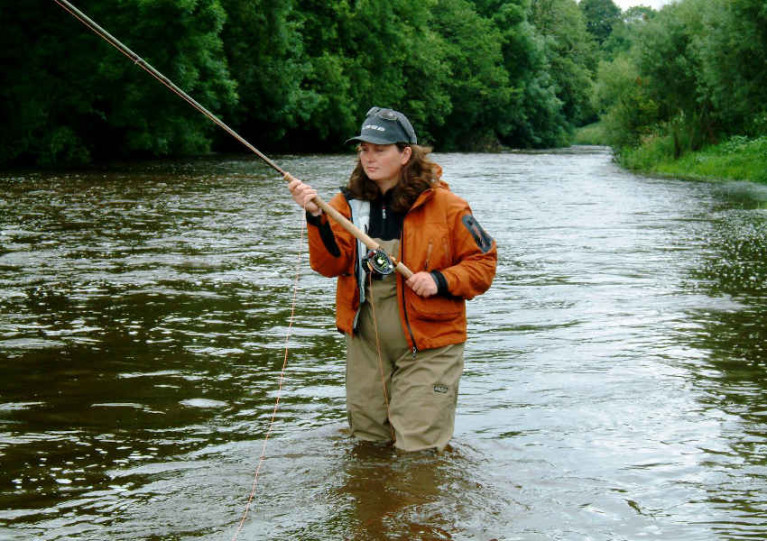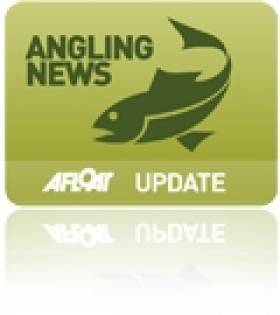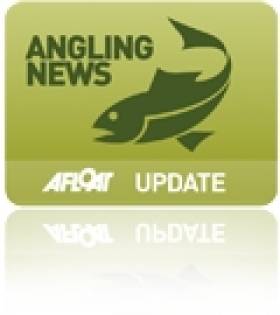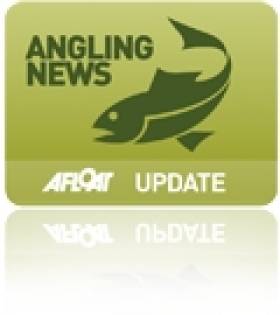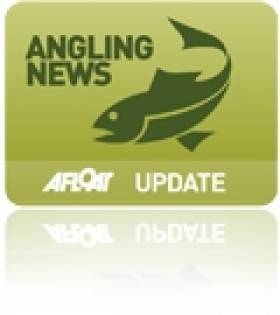Displaying items by tag: Glenda Powell
Open Call For Women To Try Angling At Events Throughout 2020
Inland Fisheries Ireland (IFI) will be running a number of events to give women the opportunity to try angling in 2020.
Renowned angler Glenda Powell, one of the world’s leading fly-casting instructors, has partnered with IFI to teach the participants around various venues in Ireland from April to September of this year.
The aim of the programme is to give women an opportunity to try fishing in a relaxed and supportive environment with other beginners.
Each participant will be concentrated on as an individual and the aim is to develop her own personal requirements during the programme to enable learning.
The course will be a mixture of spinning and fly fishing to ensure that each participant gets to experience a variety of fishing methods while figuring out what method works best for them.
Participants will be encouraged to progress at their own rate of learning while feeling safe in or around water. Each participant will learn a new skill and be in the outdoors and will hopefully develop an interest to continue with the sport.
Those wishing to progress to the next level in learning to fish will be encouraged to sign up to future programmes and also to join local angling clubs.
Each course will consist of a half-day session either in the morning (9.30am–1.00pm) or afternoon (2pm-5.30pm) on Saturdays at the following dates and locations:
- River Blackwater, Cork: 4 & 18 April, 16 & 30 May
- River Moy, Mayo: 6 & 20 June, 18 & 25 July
- River Shannon, Limerick: 22 & 29 August, 5 & 12 September
Suzanne Campion, head of business development at IFI, said: “We are delighted to be able to offer this pilot programme to women as an opportunity to not only learn fishing but have the chance to develop a new skill and past time.
“In today’s society, outdoor recreational activities are more important than ever from a health and well-being perspective and in Ireland, we are uniquely placed with the breadth and quality of our fisheries resource which is available to all to enjoy.
“We want to give these women a unique opportunity to be able to try out this sport in a relaxed and supportive environment among some of our greatest natural resources here in Ireland.”
The programme is open to all women aged 18 and over. Booking is essential as there are a limited number of spaces. If you are interested in taking part or would like more information, click HERE.
Cork Angling Documentary Makes The Film Festival Rounds
#Angling - A short documentary on top fly-fishing name Glenda Powell is garnering plaudits at film festivals around the world.
And as Ellie O'Byrne writes in the Irish Examiner, the film sprang out of an article on the world-champion fly-caster for that very newspaper by ecologist Carl Dixon.
Unwinding is a five-minute short that illustrates Powell's love of angling on the River Blackwater and the nature that surrounds her as she casts her flies.
Inspired by Powell's story after an assignment for the Examiner in 2011, Dixon explains how he completed a filmmaking course to learn the ropes before taking up the camera for the €800 micro-budget film.
And it seems his dedication has paid off, with film festivals as far afield as Washington and California including the short in their selections.
The Irish Examiner has more on the story HERE.
Angling and Marine Show a First for Ballybunion
#ANGLING - Top angling photographer and TV presenter Harry Gibney will be among the guests at the first Ballybunion Angling and Marine Show from 23-25 March.
According to The Kerryman, the show is the brainchild of local angler Mike Enright who has planned a mixture of competition and presentations from some of Europe's best known angling experts in the Co Kerry seaside town.
Among the events, Gibney will be sharing some of his top photography tips, while former long-distance fly champion Glenda Powell will present a fly fishing workshop. Other special guests include five-time world fly tying champion Gavin Hughes and celebrity chef Bryce Collins.
But the focus of the weekend is definitely on angling, with the Brian Martin Memrorial Cup set to be decided.
"Kerry has some of the finest angling facilities in the country yet it has never been promoted so we're hoping to change that," said Enright.
The Kerryman has more on the story HERE.
Second Irish Fly Fair Set To Be Bigger and Better
#ANGLING - The Irish Fly Fair and Angling Show at the Galway Bay Hotel next weekend be "the biggest of its kind in Ireland", hosting the largest number of fly tyers and trade stands from over 15 countries, according to organisers.
The two-day exhibition, now in its second year, will welcome some of the world's top fly tyers and angling celebrities to Salthill.
As with the first event last November, visitors will have the opportunity to learn from the world's best fly dressers and casters, with tuition provided by APGAI Ireland.
Returning angling celebs Hywel Morgan, Glenda Powell, Stevie Munn, Paddy McDonnell, Peter O’Reilly will be joined by newcomer Scott MacKenzie to advise on all aspects of fly fishing.
Among the new events this year is the youth fly tying competition, giving younger anglers a chance to show the pros what they can do.
Experts from Inland Fisheries Ireland, the Wild Trout Trust and many more will also be hosting talks and seminar on various angling-related topics.
And all that is aside from the huge trade aspect of the weekend.
"Building on the success of last year’s show, where business was brisk, the 2011 show has attracted trade from all over Europe who are keen to come to Galway and exhibit to the Irish market," said organiser Grace McDermott.
For more details on the second annual Irish Fly Fair and Angling Show visit www.irishflyfair.com.
Kerry Makes Moves to Promote Angling
A recent series of workshops was hosted in Kerry aimed at training angling guides in order to develop the sport in the Kingdom.
The Kerryman reports that 15 potential guides participated in the six-day programme on the River Laune, led by world champion fly-caster Glenda Powell.
Interested individuals were given an introduction to the world of angling guides, covering topics from fishing methods to health and safety, boat handling and teaching fly-casting.
The scheme will soon be supplemented by an online booking system for permits for anyone interested in game angling in Kerry.


























